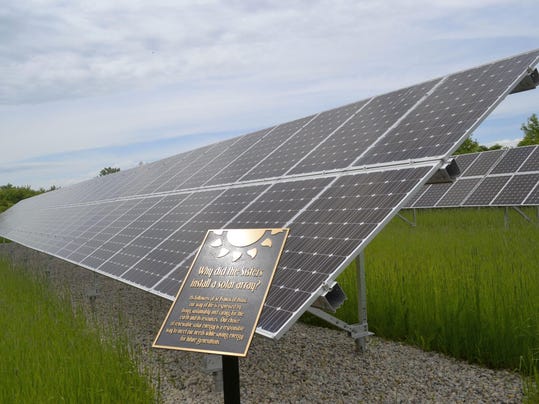A lively exchange on the deteriorating regulatory climate for low electricity users and customer-generators is unfolding in the Stevens Point Journal.
On the eve of this year’s Energy Fair, Midwest Renewable Energy Director executive director Nick Hylla kicked off the exchange with a guest column surveying the damaging effects of rate restructuring. Two weeks ago, the Journal published a letter from Mark Meyer, a former PSC Commissioner and the executive director of a utility front group called Fair Rates for Wisconsin’s Dairyland (FRWD), In addition to dismissing the MREA as a special interest group, Meyer’s letter defended the utilities’ rate restructuring proposals and endorsed the solar taxes approved last year by the Public Service Commission. The most recent person to enter the fray is RENEW’s Michael Vickerman, who weighed in with a stinging rebuttal to Meyer, which appeared in print a few days ago (see below). Enjoy.
No,
rate hikes for solar don’t make sense
rate hikes for solar don’t make sense
Letters
to the editor7:02 p.m. CDT July 9, 2015
to the editor7:02 p.m. CDT July 9, 2015

(Photo: File/Gannett Wisconsin Media)
EDITOR: Mark Meyer’s recent guest column in the Stevens Point
Journal (“Yes, rate hikes for solar make sense“) is
the latest example of a pro-utility hit piece where the author assails solar
energy with conjecture but fails to present any numerical evidence documenting
the supposed problem that’s got him so excited.
Journal (“Yes, rate hikes for solar make sense“) is
the latest example of a pro-utility hit piece where the author assails solar
energy with conjecture but fails to present any numerical evidence documenting
the supposed problem that’s got him so excited.
What Meyer didn’t convey to the reader is that his organization
is a newly formed special interest “front group” funded by monopoly
utility companies including Wisconsin Public Service and We Energies. These
entrenched utilities have a fully vested interest in bottling up competition
from rooftop solar.
is a newly formed special interest “front group” funded by monopoly
utility companies including Wisconsin Public Service and We Energies. These
entrenched utilities have a fully vested interest in bottling up competition
from rooftop solar.
When Meyer was a utility regulator, he would have demanded to
see the numbers that prove how the costs and benefits of solar energy stack up.
Now, as a cheerleader for the state’s largest electric utilities, he doesn’t
have to, preferring instead to toss out specious claims in sentences that begin
with “utilities believe” and “they contend.”
see the numbers that prove how the costs and benefits of solar energy stack up.
Now, as a cheerleader for the state’s largest electric utilities, he doesn’t
have to, preferring instead to toss out specious claims in sentences that begin
with “utilities believe” and “they contend.”
Unlike Wisconsin, numerous other states, including Vermont,
Mississippi and Minnesota, have regulators or state legislatures that insisted
on impartial, independent analysis to document the costs and benefits of solar
energy generated by electricity customers.
Mississippi and Minnesota, have regulators or state legislatures that insisted
on impartial, independent analysis to document the costs and benefits of solar
energy generated by electricity customers.
The result: Solar energy has been shown time and again to
deliver benefits that equal or exceed the costs to utilities. In some cases it
is the solar customers who aren’t receiving proper compensation for the
benefits they provide to the utility and other customers.
deliver benefits that equal or exceed the costs to utilities. In some cases it
is the solar customers who aren’t receiving proper compensation for the
benefits they provide to the utility and other customers.
Instead, Wisconsin regulators authorized We Energies, the
state’s largest monopoly electricity provider and a principal backer of Meyer’s
group, to levy a hefty tax on customer generation of renewable electricity
beginning next year. And what does that penalty look like? As it stands today,
that tax would siphon off one-third of a customer’s savings from a solar system
and redirect it into We Energies’ coffers.
state’s largest monopoly electricity provider and a principal backer of Meyer’s
group, to levy a hefty tax on customer generation of renewable electricity
beginning next year. And what does that penalty look like? As it stands today,
that tax would siphon off one-third of a customer’s savings from a solar system
and redirect it into We Energies’ coffers.
As long as Mr. Meyer continues to advance the narrow aims of
for-profit monopolies, his professed support for “the expansion of
distributed generation” lacks credibility.
for-profit monopolies, his professed support for “the expansion of
distributed generation” lacks credibility.
Michael Vickerman,
Madison
The writer is program and policy director of
RENEW Wisconsin, online atwww.renewwisconsin.org.
RENEW Wisconsin, online atwww.renewwisconsin.org.
